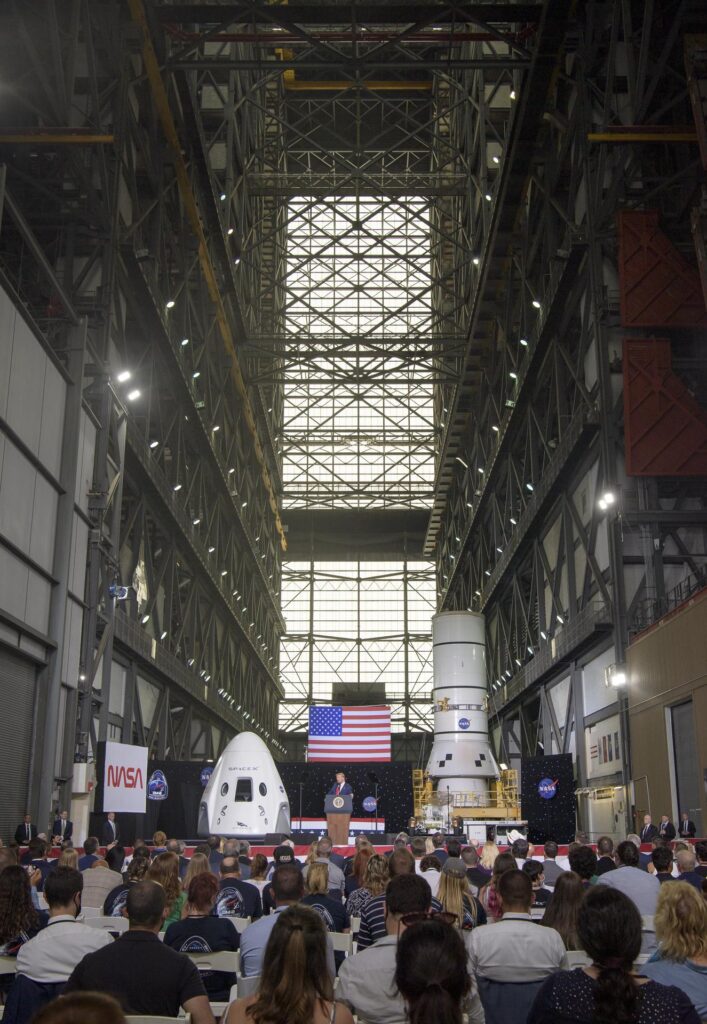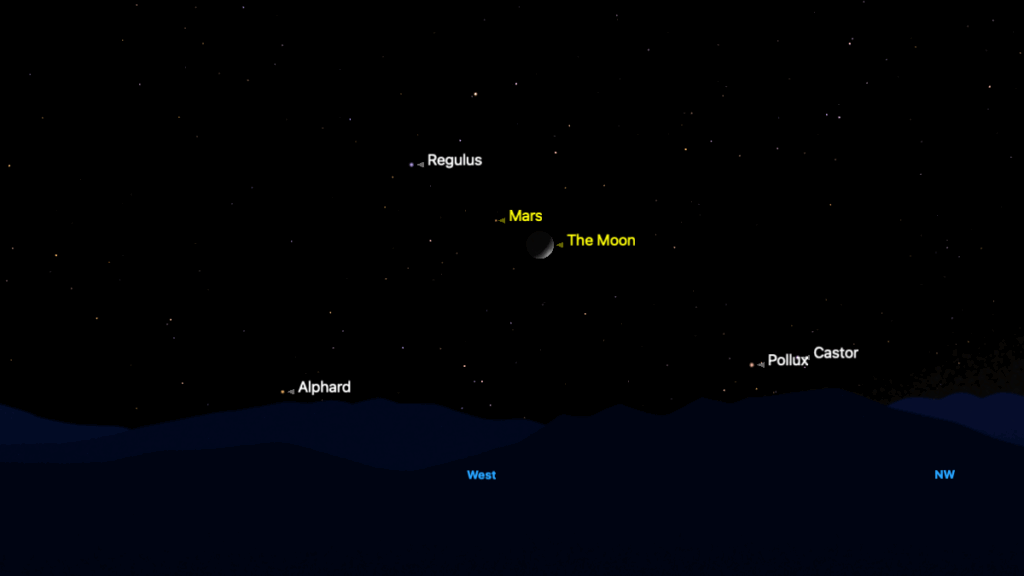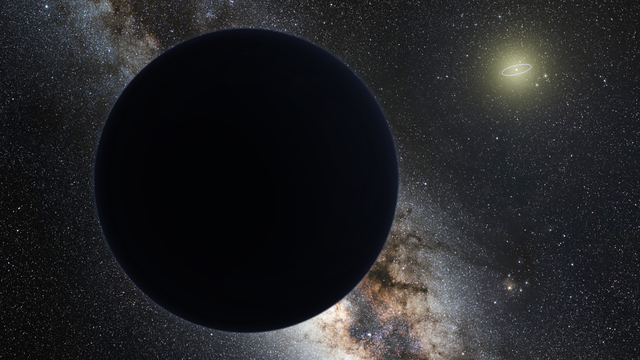On Aug. 12, 2026, a total solar eclipse will be visible from within a broad path sweeping from remote Russian Siberia to eastern Greenland, western Iceland and northern Spain. A total solar eclipse occurs when the moon drifts in front of the sun while it’s slightly larger in apparent size so that the moon completely covers the sun’s disk.
Peaking at 2 minutes, 18 seconds, the Aug. 12, 2026, total solar eclipse will be the first time mainland Europe has experienced totality in the 21st century.
Related: What’s the difference between a total solar eclipse and an annular solar eclipse?
During the partial phases of a total solar eclipse, it is unsafe to look directly at the sun; you must use solar eclipse glasses designed for solar viewing. Read our guide on how to observe the sun safely.
Here are 16 spectacular viewing locations for this rare celestial event. However, as seen from any of these spots, the eclipsed sun will never be higher than 26 degrees above the horizon, so make sure to double-check sight lines from your location ahead of time. All times and cloud statistics come from Time and Date and are for totality only. A partial solar eclipse will be visible around 60 minutes before and after totality.
1. Scoresby Sund

Scoresby Sund
Location: Eastern Greenland
Time and duration of totality: 4:34 p.m. CGST; 1 minute, 45 seconds
Chance of clouds: 67%
This large fjord system on the eastern coast of Greenland is about 68 miles (110 kilometers) long and could provide a haven of calm water and clear weather for cruise ships. Totality will take place 24 degrees above the west-southwest horizon.
2. Blue Lagoon

Blue Lagoon
Location: Reykjanes Peninsula, southwestern Iceland
Time and duration of totality: 5:48 p.m. GMT; 1 minute, 37 seconds
Chance of clouds: 74%
This geothermal spa in southwestern Iceland, located beside a geothermal power station, is close to the Sundhnukagigar volcano near Grindavík, which erupted in 2023 and 2024.
3. Grótta Lighthouse
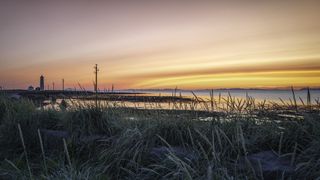
Grótta Lighthouse
Location: Reykjavik, Iceland
Time and duration of totality: 5:48 p.m. GMT; 1 minute, 4 seconds
Chance of clouds: 76%
Grótta Lighthouse — a popular place for visitors to Iceland’s capital, Reykjavik, to see the northern lights — will likely be a hub for eclipse chasers.
4. Búðakirkja
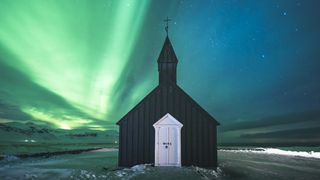
Búðakirkja
Location: Budir, Iceland
Time and duration of totality: 5:46 p.m. GMT; 1 minute, 57 seconds
Chance of clouds: 76%
This 19th-century church is a favorite location among aurora photographers and will be busy on Aug. 12, 2026.
5. Svörtuloft Lighthouse
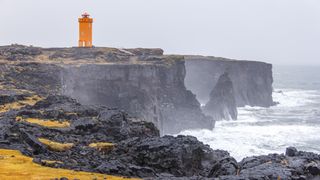
Svörtuloft Lighthouse
Location: Snaefellsnes Peninsula, Iceland
Time and duration of totality: 5:45 p.m. GMT; 2 minutes, 10 seconds
Chance of clouds: 79%
Head to this lighthouse and nearby Skarðsvík Beach on Iceland’s Snaefellsnes Peninsula for this region’s longest totality on land.
6. Garður Old Lighthouse
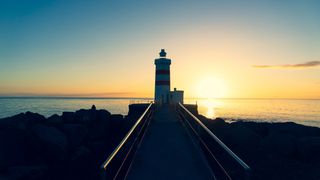
Garður Old Lighthouse
Location: Garður, Iceland
Time and duration of totality: 5:47 p.m. GMT; 1 minute, 42 seconds
Chance of clouds: 74%
This lighthouse at the extreme tip of the Reykjanes Peninsula is just a few miles from Keflavik Airport. It will be a good place to observe the behavior of seabirds.
7. Zaragoza
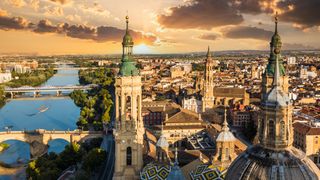
Zaragoza
Location: Aragon, Spain
Time and duration of totality: 8:28 p.m. CEST; 1 minute, 23 seconds
Chance of clouds: 19%
Just north of the centerline in eastern Spain, this city of 666,000 on the Ebro river will have plenty of hotel rooms and, unlike anywhere farther west, a view of a partially eclipsed sunset soon after totality.
8. Malvarrosa beach
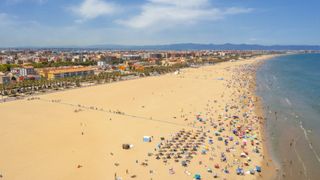
Malvarrosa beach
Location: Valencia, Spain
Time and duration of totality: 8:32 p.m. CEST; 1 minute, 2 seconds
Chance of clouds: 31%
Sight lines will be everything if you plan to view the eclipse from Spain’s east coast. However, from Valencia’s huge Malvarrosa beach, the eclipsed sun will be 4.5 degrees above the western horizon.
9. Sant Elm
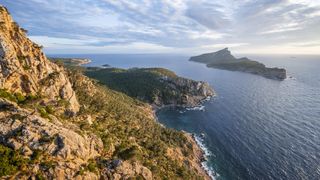
Sant Elm
Location: Mallorca, Spain
Time and duration of totality: 8:31 p.m. CEST; 1 minute, 36 seconds
Chance of clouds: 35%
The totally eclipsed sun will hang just 3 degrees above the western horizon from Mallorca in Spain’s Balearic Islands, giving the sun’s corona a golden look. It’s risky with clouds common on the horizon, but the views from Sant Elm of the eclipse alongside the island of Sa Dragonera could be spectacular.
10. Gijón
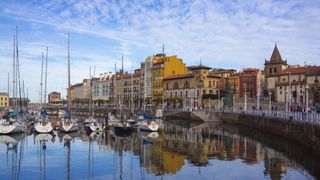
Gijón
Location: Asturias, Spain
Time and duration of totality: 8:26 p.m. CEST; 1 minute, 46 seconds
Chance of clouds: 54%
This city of 270,000 on the northern edge of the path of totality, famous for its many “sidrerías” (cider bars), will toast an eclipsed sun 10 degrees above the west-northwest horizon.
11. A Coruña
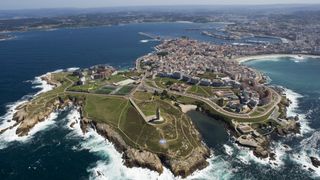
A Coruña
Location: Galicia, Spain
Time and duration of totality: 8:27 p.m. CEST; 1 minute, 15 seconds
Chance of clouds: 54%
A Coruña will see the highest eclipse in Spain, 12 degrees above the west-northwest horizon. Potential viewing sites include the Roman-era Tower of Hercules — the oldest lighthouse in the world — on a peninsula close to the city center.
12. Palencia
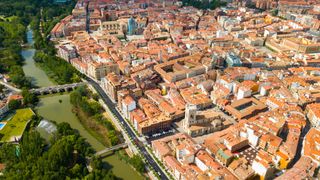
Palencia
Location: Castile and León, Spain
Time and duration of totality: 8:29 p.m. CEST; 1 minute, 42 seconds
Chance of clouds: 23%
The small city of Palencia (not to be confused with Valencia), which is most famous for a statue of Christ that looks down over the city, is full of beautiful architecture. The sky here is nearly dark, and in August, it will likely be clear. The eclipsed sun will sit 9 degrees above the west-northwest horizon.
13. Aras de los Olmos Starlight Reserve
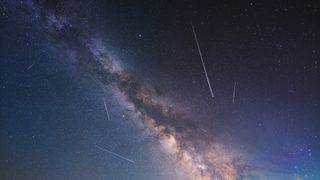
Aras de los Olmos Starlight Reserve
Location: Los Serranos, Valencia, Spain
Time and duration of totality: 8:31 p.m. CEST; 1 minute, 15 seconds
Chance of clouds: 16%
The Aras de los Olmos Starlight Reserve, located in the mountains west of Valencia, is home to an observatory. It could make the ideal place to enjoy totality 5 degrees above the western horizon, watch a partially eclipsed sunset, and then see both the Milky Way and the peak of the Perseid meteor shower.
14. Segovia
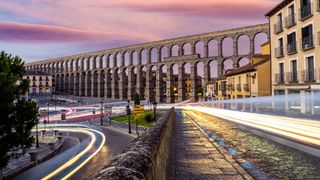
Segovia
Location: Castile and León, Spain
Time and duration of totality: 8:31 p.m. CEST, 54 seconds
Chance of clouds: 19%
Segovia, about an hour from Madrid, is famous for its Roman-era aqueduct with more than 160 granite arches. It will offer almost a minute of totality 8 degrees above the west-northwest horizon.
15. Sigüenza
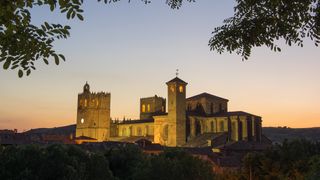
Sigüenza
Location: Guadalajara, Spain
Time and duration of totality: 8:30 p.m. CEST; 1 minute, 38 seconds
Chance of clouds: 25%
Also about an hour outside Madrid, Guadalajara is known for Sigüenza Castle, Sigüenza Cathedral and the nearby Barranco del Río Dulce (Sweet River Ravine) Natural Park, where you’ll find waterfalls, trails and rock formations. The eclipsed sun will sit 7 degrees above the west-northwest horizon.
16. Peñíscola Castle
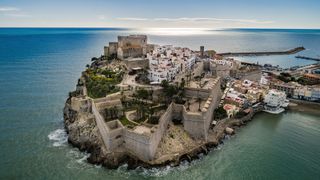
Peñíscola Castle
Location: Peñíscola, Valencia, Spain
Time and duration of totality: 8:39 p.m. CEST; 1 minute, 39 seconds
Chance of clouds: 35%
The view of an eclipsed sun just above the mountains is the prize from this restored castle just north of the centerline on Spain’s east coast.

